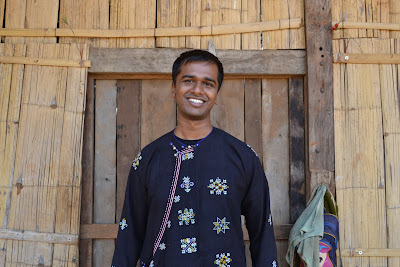This past week, Fulbright researchers throughout Southeast Asia came together to share their work in presentations for 4 days and nights at the beautiful Dusit Thani Hotel near Lumpini Park in Bangkok.
Melon Carving ~ Something to try next holiday picnic!
Colleagues shared their work through slideshow presentations and video. Here are a few notes that summarize the fascinating presentations I saw:
- One Fulbrighter and coffee connoisseur told us about her work in Vietnam, which is the world’s second largest supplier of coffee beans(!) mainly in the form of small, family-run farms that sell to local distributors and then to instant coffee companies.
- Another colleague studying urban planning in Singapore explains the complex issues of identity and freedom in a nation that is as multicultural as it is highly monitored.
- In Cambodia, creativity in industrial design is a valuable commodity that one Fulbrighter from Rhode Island School of Design provides through the redesign of a water purification system with a local, forward thinking company.
- The Akha are an ethnic minority with a presence in Thailand, southern China, and Burma. Their language existed only orally until a recent conference supported by China when a written form was created- into three different kinds of script for each country where they are present!
Thai dancer in a bird-like costume enchants us in her shiny gold outfit.
- In the Philippines, a beautiful oral tradition in a remote northern island is now being lost. When sung, the language’s jargon distinguishes the many types of fishing and bodies of water specific to the region that makes it useful for communities to address issues as a group.
- After alluding to the movie and tv sitcom Outsourced, one Fulbrighter explains how Manila is oft referred to as the “back office” of the world --and has recently helped the Philippines surpass India as the preferred country for outsourcing! Apparently, Filipinos have gained the cultural reputation for being more patient and better listeners. The English spoken in the Philippines is easier for American callers to understand as opposed to the British accent of most Indians.
- Another Fulbrighter in the Philippines researches trafficking with her husband who helps interview women for her upcoming book "The Low-Flying Dove."
Chefs at the gala - Giving me even more reason to love Thai food
- In Indonesia, one professor explains to us that the jilbab or headscarf is less a sign of religious piety to Islam than the recitation of the Quaran in Arabic. Here, the head covering is a fashionable accessory of one's cosmopolitan wardrobe - proving that understanding context is key to reading what clothing expresses to the wearer.
- In a small region of Malaysia, one Fulbright researcher and dancer spends her days promoting and documenting all-female troup performances of an elegant indigenous dance where only female spectators are allowed… unless a male character plays the clown role! After twenty years of being forbidden, this exceptional art form survives in schools where it is taught as a prescribed (though still beautiful!) discipline instead of being celebrated as the spiritual ceremony it once was.
Kelly sporting northern Thai hair accessory
Listening and moderating for the panels titled Art & Culture and Art & Education respectively, I learned that my previous classmate and friend from Holy Cross Mr. John Vo is a visual artist and Fulbright researcher in Vietnam. His paintings reflect a sincere appreciation for his family’s Vietnamese heritage.
Thin verticals are outstretched arms the length of the canvas against an uninterrupted background of water and sky in shades of blue. The image is emotional, inspired by a story his grandmother recounted to him years ago and remained etched in his memory ever since. While exploring traditional art mediums of Vietnamese culture, his interactions with students encourage originality instead of copying masterworks, which is a more common practice at his art school.





















